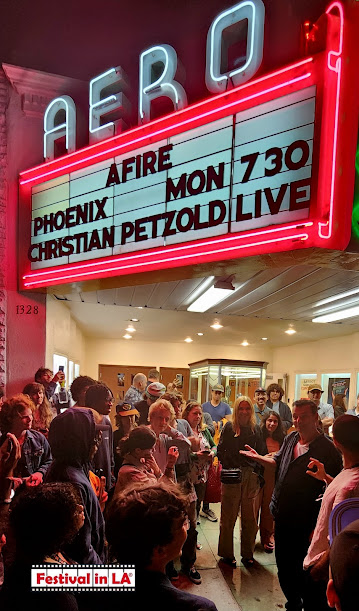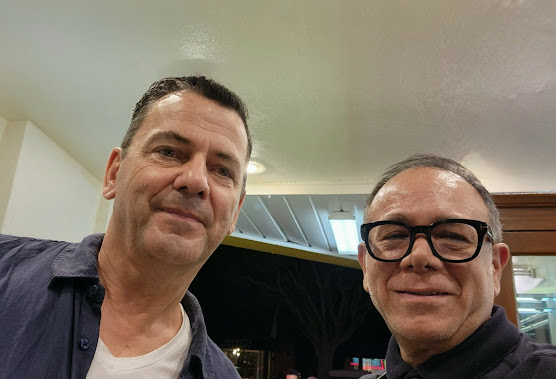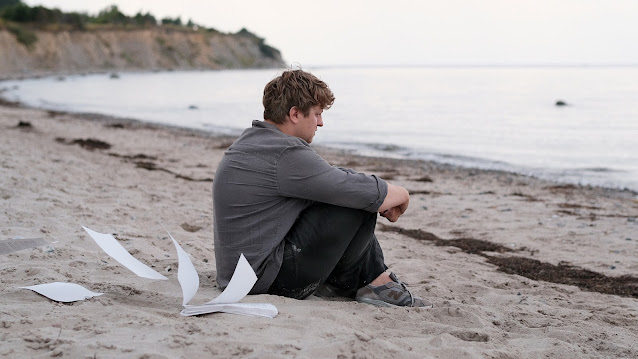By José Alberto Hermosillo
“Afire” is an elegantly simple film driven by fire, desire, and dry humor, directed by the renowned German filmmaker Christian Petzold, who delivers yet another masterful work.
The story unfolds gradually. As it progresses, the plot blooms into a wave of intense emotions. The characters’ relationships evolve naturally, and their romances ignite both internally and environmentally.
Leon and Felix drive to a seaside resort town on the Baltic Coast to enjoy some quality time when their car breaks down in the woods. They must walk several miles to reach Felix’s mother’s country house.
Absorbed in finishing his next novel, Leon, played by Thomas Schubert, becomes the story’s anti-hero because of his insecurities and desire to be left alone. The joy of having dinner with friends slips away from him. Others perceive his uncharismatic attitude as a waste of his potential. According to director Christian Petzold, Leon is a total jerk that many viewers might relate to.
His partner, Felix (Langston Uibel), is an outgoing photographer searching for inspiration for a series of portraits. While trying to sleep, they listen to a series of sexual sounds from the next room. Nadja is having sex with Devid (Enno Trebs), the attractive beach lifeguard who openly embraces his bisexuality.
Paola Bear (“Franz,” “Never Look Away,” “Undine”) delivers a superb performance as Nadja, an educated, mysterious, and blissful woman who, aside from her sex addiction, sells ice cream in the plaza while hiding her literary knowledge.
Leon’s novel, “Club Sandwich,” turned out very poorly. It took Christian three days to write the first chapter for the publisher Helmut (Mathias Brandt), who then read it aloud and found it awkward on film.
In the scene where Nadja criticizes Leon’s work, he dies figuratively, unaware that she is more than just an ice cream seller. She doesn’t show off her intellectual abilities or her true self, so she must seem casual and sincere about herself and his feelings. At the same time, he needs to be cautious and smart about the situation because now he realizes she is not the object of his desire.
Nevertheless, Leon’s uncharismatic, insecure, and contradictory character is depicted with Christian’s personal touches and autobiographical elements in his writing. It functions as a form of psychoanalysis for the director, who is also an artist. He portrayed himself as a loser in his early films, like in “Cuba Libre,” so why not continue doing so in “Afire”?
In Christian Petzold’s previous complex projects, “Transit” and “Undine,” the female characters always betray their male counterparts, and “Afire” is no exception. The male figures consistently struggle to express their feelings, and their difficulties with seeking intimacy are clear.
After finishing filming “Undine,” the award-winning director planned to meet with his recurring actress, Paola Bear, in Paris in 2020. However, both were stranded in their respective cities due to COVID-19. While recovering, they decided to meet in Berlin to start working on “Afire”—titled in German, “Roter Himmel” or “Red Sky.” Both the director and the actress had previously collaborated on “Transit” and “Undine.”
In a conversation with dozens of fans and film students between the “Afire” and “Phoenix” screenings in Santa Monica, California, Christian Petzold said he was fascinated by dystopian movies. Now, he writes and adapts films that are more rooted in reality.
 |
| Christian Petzold & film students at the Aero in Santa Monica. Photo José Alberto Hermosillo. Copyright © Festival in LA, 2023 |
Petzold added something even more profound: “The badge we leave behind is meaningful and will make sense later in our professional and personal lives. Because the real value is not on material things such as a car, a book, or a manuscript, it is more about the emotional badges within a relationship and the possibilities of personal growth with the person you love.”
 | |
|
People often asked him if he would choose another element to complete the trilogy after starting the series with “Undine,” representing water, and “Afire,” representing fire. The answer is no. He plans to take a sabbatical.
The director does not lecture his audience about the environment or global warming through his latest work, nor does he have a political agenda. The fire symbolizes what needs to be extinguished, and the main characters could deepen their intellectual abilities, adding complexity and surprises to the ending.
The idea of “labor and leisure” shown in “Afire,” where a writer retreats to the woods to focus on his next novel, is similar to Mia Handset-Løve’s 2021 film “Bergman Island,” where a couple seeks inspiration for their upcoming projects on the same island where Ingmar Bergman created his most famous works.
In John Stahl’s 1945 thriller “Leave Her to Heaven,” everything is intentionally ambiguous, making viewers wonder who the characters are: the writer and the obsessed woman who never considers the consequences of her actions. Lastly, Roman Polanski’s “The Ghost Writer” presents a darker, more sinister example set in Martha’s Vineyard, where a second writer is hired to replace and write the memoirs of a former British Prime Minister.

The Grand Jury Prize Silver Bear winner at the Berlin Film Festival is a movie that makes viewers aware of their surroundings. Petzold’s latest project is clever, humorous, and sophisticated, where audiences can relate to these smart, well-developed characters, and where dreams can be tested by weather conditions and climate change.
 | |
|
Elle: The New “Basic Instinct” with a “French Twist”
IF YOU ARE READING FROM A MOBILE DEVICE, CLICK: view web version FOR OTHER COOL FEATURES SUCH AS TRANSLATE POWERED BY GOOGLE, AN INTERACTIVE FILM FESTIVAL CALENDAR, AND MORE AWESOME ARTICLES.











